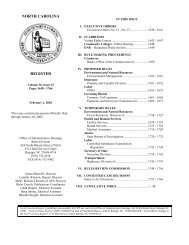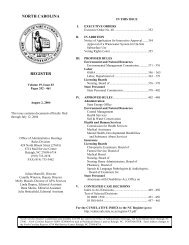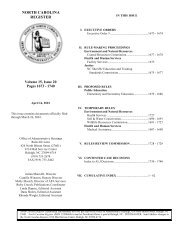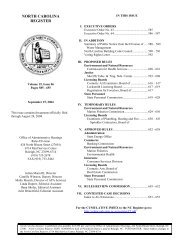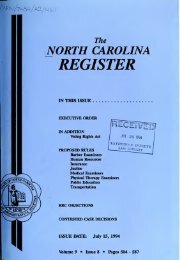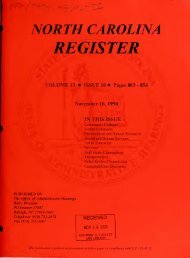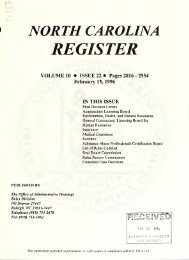NC Register Volume 21 Issue 09 - Office of Administrative Hearings
NC Register Volume 21 Issue 09 - Office of Administrative Hearings
NC Register Volume 21 Issue 09 - Office of Administrative Hearings
Create successful ePaper yourself
Turn your PDF publications into a flip-book with our unique Google optimized e-Paper software.
CONTESTED CASE DECISIONS<br />
"Parapr<strong>of</strong>essional" within the mh/dd/sas [mental health/developmental disabilities/substance abuse services] system <strong>of</strong> care means<br />
an individual who, with the exception <strong>of</strong> staff providing respite services or personal care services, has a GED or high school<br />
diploma; or no GED or high school diploma, employed prior to November 1, 2001 to provide a mh/dd/sa service. Supervision shall<br />
be provided by a qualified pr<strong>of</strong>essional or associate pr<strong>of</strong>essional with the population served. The supervisor and the employee shall<br />
develop an individualized supervision plan upon hiring. The parties shall review the plan annually.<br />
The federal Centers for Medicare and Medicaid Services note a “consideration” concerning the delivery <strong>of</strong> a waiver service, such as<br />
that in question in this action, Supported Employment:<br />
B. Considerations Related to Specific Services.—<br />
1. FFP [Federal Financial Participation] is not available for personal care services or any waiver services when provided to<br />
recipients by legally responsible relatives, i.e., spouses or parents <strong>of</strong> minor children, when the services are those that these<br />
persons are already legally obligated to provide.<br />
2. Services provided by relatives or friends, except as noted in item B.1., may be covered only if the relatives or friends<br />
meet the qualifications for providers <strong>of</strong> care, there are strict controls to assure that payment is made to the relative or friend<br />
as providers only in return for specific services rendered, and there is adequate justification as to why the relative or friend<br />
is the provider <strong>of</strong> care, e.g., lack <strong>of</strong> other qualified provider in remote areas. Medicaid payment may be made to qualified<br />
parents <strong>of</strong> minor children or to spouses for extraordinary services requiring specialized skills (e.g., skilled nursing, physical<br />
therapy) which such people are not already legally obligated to provide.<br />
State Medicaid Manual, §4442.3<br />
BASED UPON careful consideration <strong>of</strong> the stipulations <strong>of</strong> the parties, the sworn testimony <strong>of</strong> the witnesses presented at the<br />
hearing, the deposition <strong>of</strong> Mr. Piper, documents and exhibits received and admitted into evidence, and the entirety <strong>of</strong> the record in this<br />
proceeding, the Undersigned makes the following findings <strong>of</strong> fact. In making the findings <strong>of</strong> fact, the Undersigned has weighed all the<br />
evidence and has assessed the credibility <strong>of</strong> the witnesses by taking into account the appropriate factors for judgment <strong>of</strong> credibility,<br />
including but not limited to the demeanor <strong>of</strong> the witnesses, any interests, bias, or prejudice a witness may have, the opportunity <strong>of</strong> the<br />
witness to see, hear, know or remember the facts or occurrences about which the witnesses testified, whether the testimony <strong>of</strong> the<br />
witness is reasonable, and whether the testimony is consistent with all other believable evidence in the case.<br />
FINDINGS OF FACT<br />
Petitioner<br />
1. Petitioner, Mr. Worley, is <strong>21</strong> years old and lives with his mother, who is his guardian. (Joint Pre-Trial Order, filed July 5,<br />
2005). His grandparents’ live on the same tract <strong>of</strong> land and can, depending on their own health issues, provide care. (Respondent’s<br />
Ex. 1, p. 4, T pp. 15, 86-87)<br />
2. Petitioner presents as a large individual, 5’7”, <strong>21</strong>0 lbs. (Respondent’s Ex. 1, p. 9, Piper Deposition, pp. 12, 39)<br />
3. Petitioner is diagnosed with Personality Disorder due to Medical Condition – Combined Type: Disinhibited & Aggressive,<br />
Mild Mental Retardation, Moyamoya Disease (a progressive cerebrovascular disorder caused by blocked arteries at the base <strong>of</strong> the<br />
brain in an area called the basal ganglia); Transcerebral Ischemia; History <strong>of</strong> Major Motor Seizure/Petit mal absent. (Joint Pre-Trial<br />
Order, filed July 5, 2005; T pp. 37, 67, 97-99; Piper Deposition, p. 9; Respondent’s Ex. 1, p. 3). His last stroke occurred at age 13.<br />
(T. p. 71)<br />
4. Petitioner’s most recent psychological assessment (dated August 30, 2005) found him to fall within a moderate to mild range<br />
<strong>of</strong> mental retardation. “He displayed relative strengths for tools, domestics, and health and safety, suggesting that he possesses some<br />
practical daily skills. As was suggested with the Vineland Adaptive Behavioral Scales, [Petitioner] functions at a very low level with<br />
regard to basic concepts. He maintains only a rudimentary understanding <strong>of</strong> time, money or measurements. Nevertheless, when<br />
compared to a group <strong>of</strong> neuropsychologically disabled adults, he functions fairly well given his disabilities.” (Respondent’s Ex. 7,<br />
p.3) Petitioner’s Vineland Adaptive Behavioral Scales showed a composite score <strong>of</strong> 41, which resulted in a finding that he possesses<br />
the adaptive behavioral skills <strong>of</strong> an individual <strong>of</strong> age six years, seven months. (Id. at p. 4)<br />
5. Petitioner, at the time <strong>of</strong> hearing was prescribed a variety <strong>of</strong> medication. As noted in Petitioner’s Medical Information with<br />
his CAP-MR/DD Plan <strong>of</strong> Care (Respondent’s Ex. 1, pp. 3-4):<br />
a. Risperdal (Improve clarity, reality basing);<br />
b. Topamax (Helps Seizure control);<br />
c. Lamictal (Helps Seizure control);<br />
d. Dicl<strong>of</strong>enac (Cataflan) (Analgesic – Headache pain; anti-inflammatory);<br />
e. Baby aspirin (Blood thinner, reduces strokes);<br />
<strong>21</strong>:<strong>09</strong> NORTH CAROLINA REGISTER NOVEMBER 1, 2006<br />
856




